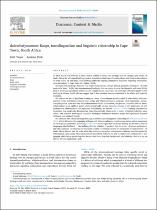| dc.identifier.citation | Toyer, Z. and Peck, A., 2023. dalawhatyoumust: Kaaps, translingualism and linguistic citizenship in Cape Town, South Africa. Discourse, Context & Media, 52, p.100684. | en_US |
| dc.description.abstract | In 2016 Wayde Van Niekerk, a South African athlete of mixed-race heritage won an Olympic gold medal. In South Africa, his win caused hashtags such as #proudlysouthafrican, #blackexcellence and #colouredexcellence to trend online. By and large, these hashtags index the ongoing competitive discourses regarding nationalism, race and culture in Cape Town (cf. Author, 2018). Amongst these hashtags, however, was #dalawhatyoumust, a Kaaps hashtag generally meaning to “do what needs to be done”. Unlike the aforementioned hashtags, this one seems to cross the linguistic and racial divide despite its strong associations with Coloured1 people on the Cape Flats. The seemingly effortless uptake of this hashtag by diverse South Africans suggest that it has somehow become unmoored of its ethnic and linguistic inception. We explore the use of this Kaaps hashtag as a form of translingual practice which is affect-laden and trans portable across and between diverse users online and which promotes a particular “cool Capetonian” culture. Analyzing select posts from the #dalawhatyoumust thread on Facebook, we provide a nuanced look at #dala whatyoumust as an uplifting genre which proleptically advises nameless viewers of the importance of selfactualization, determination and aspiration. Additionally, we include Goffman’s (1974) framing foundation to investigate how positivistic discourse has been rhizomatically taken up by a ‘realm’ of implicit collective users online. This research interrogates long-held ideological boundaries between Kaaps and legitimized Standard Afrikaans and standard English. We conclude with a focus on Kaaps hashtags as semiotic acts of Linguistic Citizenship (cf. Williams and Stroud, 2013) which allows for the conjoining of Kaaps with diverse audiences, complex trajectories, and an assortment of accompanying semiotics. Following Stroud (2018:3) we argue that this Kaaps hashtag has become a form of languaging that facilitates “…the building of broad affinities of speakers that cut across…divisions and borders, and that negotiate co-existence/co-habitation outside of common ground in recognition of equivocation”. In South Africa, division was the order of the day and when we explore contemporary ordinary moments posted by heterogenous users using #dalawhatyoumust (henceforth #dwym) we aim to explore the ordinariness of languaging which brings people together despite their race, linguistic background, and ethnicity, that is to say an affinity of ‘cool Capetonian’ style. | en_US |

